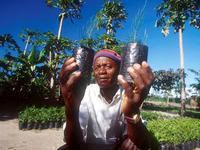Tanzania's opportunity: to produce biofuels for export to Europe, says Swedish ambassador
 Europe leads the biodiesel and biogas revolution, but ethanol is quickly catching up. In Sweden, a large effort involving all stakeholders - consumers, government, ethanol producers, car manufacturers - has resulted in a relatively fast penetration and acceptance of the biofuel and of flex-fuel cars (earlier post). Until now, Sweden imported some 75% of its ethanol from Brazil. But the country is looking abroad to diversify its portfolio of suppliers.
Europe leads the biodiesel and biogas revolution, but ethanol is quickly catching up. In Sweden, a large effort involving all stakeholders - consumers, government, ethanol producers, car manufacturers - has resulted in a relatively fast penetration and acceptance of the biofuel and of flex-fuel cars (earlier post). Until now, Sweden imported some 75% of its ethanol from Brazil. But the country is looking abroad to diversify its portfolio of suppliers.In particular, the focus is on sub-Saharan Africa. Not only does the continent hold an enormous untapped technical biofuel potential (earlier post), it also needs development, economic change, employment and strengthening of its agricultural sector. Last year, Sweden made some first, tentative investments in Mozambique (earlier post), a potential biofuels 'superpower' (earlier post).
Now, Tanzania has come into focus. The Swedish Ambassador to the large East African country, Torvald Akesson, has said that Tanzania has the possibility of taking the lead in Africa in producing biofuels for export to Europe, which needs to drastically reduce the CO2 emissions.
"Here is a window of opportunity for Tanzania following the increasing concerns of global warming in Europe and elsewhere," the envoy said during an exclusive interview with Dar es Salaam based The Guardian, which took place at the Swedish Embassy in Dar es Salaam.
He added that the Government of Sweden had decided to considerably reduce its oil dependency and replace it with biofuels. Akesson said this was a golden chance for Tanzania because there was a possibility of oil prices falling because of concerns on global warming. And if oil prices fall, only biofuels produced in countries in the South can survive.
Tanzania's 38 million in habitants currently use around 5.1 million hectares of land, out of a total 94.5 million hectares of land suitable for agriculture (see the FAO's database with the latest statistics on land-use). Even after all the food, fiber, fodder and fuel wood needs for the country's rapidly growing population are met, there still remains an enormous amount of land available for energy farming. Like Mozambique, Congo, the Central African Republic, Sudan and Angola (earlier post), Tanzania too is one of the future 'biofuels superpowers':
 biomass :: bioenergy :: biofuels :: energy :: sustainability :: ethanol :: rural development :: poverty alleviation :: biofuels trade :: exports :: Sweden :: Tanzania ::
biomass :: bioenergy :: biofuels :: energy :: sustainability :: ethanol :: rural development :: poverty alleviation :: biofuels trade :: exports :: Sweden :: Tanzania :: Currently, there are no in-depth analyses available on Tanzania's actual bioenergy potential, but we guesstimate that it will be similar to that of a country like Angola. That is: in 2050, when Tanzania's population has increased from 38 million (2005) to 67 million, the country will be able to export some 3 million barrels of oil equivalent biofuels per day - after having met the needs for food, fiber, fodder and fuel wood for Tanzania's population.
Asked to suggest a development model that could make Tanzania an advanced state, which is a prerequisite to it becoming an industrial biofuel exporter, the Swedish ambassador said there was no secret recipe. He added: "It is a matter of getting the policies and the priorities right; then hard and consistent work. I have spent more than 16 years overseas in various postings - most of them in Asia, where I have witnessed the rapid development of some Asian countries."
The Swedish envoy said that the private sector as the engine of growth could provide increased employment, such that further improvements in the investment and business climate would have positive effects as has been the case in many Asian countries.
Dwelling on relations between Sweden and Tanzania, Akesson said that cooperation was very good and friendly as it was based on a long period of close contacts and cooperation in various fields.
"Tanzania is the biggest recipient of Swedish development assistance - this year it will get approximately US dollars 100 million. Tanzania knows Sweden and Sweden knows Tanzania," he said.
On whether Sweden was satisfied with the use of that aid, he said that there were many projects and programmes that he would label as successful.
"There are certainly others where mistakes have been made or that in hind sight cannot be considered as successful. It has not been easy for the government of Tanzania to manage so many projects and programmes in the past� Sweden is a strong supporter of improving aid effectiveness. Systems, structures and processes of the government of Tanzania should be used rather than setting up parallel systems as has been the case for too long," he said.
Akesson said Sweden had agreed with the Tanzanian government that General Budget Support should be the preferred aid modality and that the ownership of the development lay clearly with the Tanzanian government.
 -------------------
-------------------
 Spanish company Ferry Group is to invest €42/US$55.2 million in a project for the production of biomass fuel pellets in Bulgaria.
The 3-year project consists of establishing plantations of paulownia trees near the city of Tran. Paulownia is a fast-growing tree used for the commercial production of fuel pellets.
Spanish company Ferry Group is to invest €42/US$55.2 million in a project for the production of biomass fuel pellets in Bulgaria.
The 3-year project consists of establishing plantations of paulownia trees near the city of Tran. Paulownia is a fast-growing tree used for the commercial production of fuel pellets.









0 Comments:
Post a Comment
Links to this post:
Create a Link
<< Home